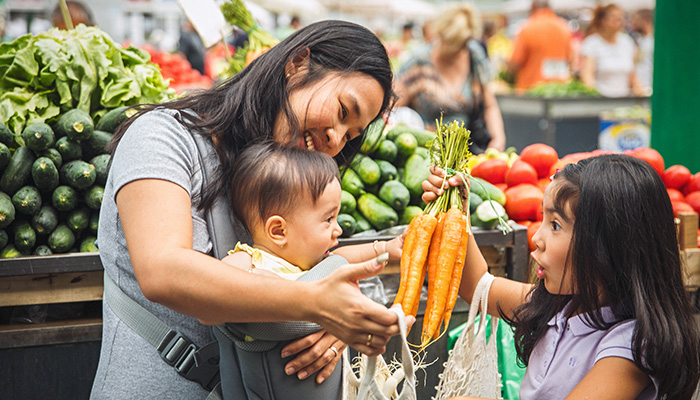
What’s not to love about your local farmer’s market? There’s the intoxicating smell of homemade, high-quality lotions, soaps, and candles. The rainbow of fresh vegetables, the sweet taste of fresh-baked goods, and the feel of delicately made handcrafts.
But did you know there are financial benefits that come from paying a visit to the farmer’s market? We’ve pulled together a list of a few of these secret perks, so that the next time you visit your local farmer’s market, you can know that you’re making solid financial choices, in addition to purchasing from your favorite cheese stand.
It’s Cheap
Goods found at a farmer’s market can often be cheaper than those you’d find in a store – especially if you’re purchasing in-season produce. Whether you’re getting a shopping bag full of kale for a dollar, an enormous head of elephant garlic for a quarter, or a tomato for 50 cents, some farmer’s market prices can’t be beat!
Of course, there are also items that will be slightly more expensive than their grocery-store counterparts, but in many cases, these items may be of higher quality, such as wild honey or farm-fresh eggs. Farmer’s markets also have a wide range of products in varieties you won’t find in stores – from the much larger elephant garlic to purple bell peppers to garlic scapes.
And, if you prefer organic or non-GMO foods, the farmer’s market is the best place to find a variety of items to add to your diet.
Food Lasts Longer
The food you buy from your local farmer’s market is fresh – often picked or collected just that morning or the day before. This means it often has a longer shelf-life than food you purchase at the store. It’s not being stored for days, weeks, or months before ending up on a store shelf – which means that when you put it in your fridge, it can stay there longer than store-bought items. In the long run, this can save you money, as you’re not purchasing produce and then having to discard it before it’s able to be used.
And, if you’re a long-term planner, this increased shelf-life can enable you to meal plan for several days or weeks in advance – which enables you to budget better and put the money saved towards paying down debt, bills, or even a little treat to brighten your day.
Need some help getting started? Our Household Cash Flow Tracker is here to help!
Teaching Kids the Value of Money
If you have children, it can be fun to visit the farmer’s market with them, and it can also teach them important life skills. Many vendors at farmer’s markets are cash-based and deal with small change and purchases – which means it’s a great opportunity to help your child learn how to handle money.
After you’ve picked out the perfect jar of honey, or the fluffiest loaf of bread, try handing your child a few dollars and having them pay the vendor. Then, have them count the change. Not only does this give them a valuable lesson on what money is used for and get them comfortable with using money to pay for necessities, it can also help sharpen their math and budgeting skills!
Try setting a budget for your Famer’s Market visit, and have your child keep a tally of what is spent. This will teach them to stick to a budget and help them see how far money can stretch when purchasing necessities like groceries. As you shop, talk to them about meal planning, and the difference between financial “needs” and “wants” – this is a valuable skill, especially when it comes to grocery shopping!
Need help budgeting? Try our budget calculator to get started!
Support Local Businesses
Farmer’s market vendors are often small businesses. They’re small, local farms, or moms trying to get a leg up by selling crafts or homemade beauty products. They’re your neighbors. By visiting your local farmer’s market, you’re directly supporting your community. It may not have immediate financial benefits for you, but the money you spend there goes back into the local market and economy, which benefits everyone – including you.
It's also an opportunity to support unique small businesses – many a farmer’s market has a local kimchi lady, or woodcarver, or a high schooler selling unique, handmade jewelry. This is a great chance to try new things, and help others thrive.
Reduce Your Carbon Footprint
If you’re someone who’s environmentally conscious, shopping at your local farmer’s market can help reduce your carbon footprint. Unlike food at your grocery store, farmer’s market produce isn’t being transported hundreds of miles before it ends up in your shopping bag. It’s grown locally, and less distance traveled means less gas used, and fewer pollutants entering the atmosphere.
Seeing financial benefit from reducing your carbon footprint is a long game – but in the years to come, you will reap the benefits of a better world for yourself and your community, which can help ensure your financial security now and in the future.
Want to learn more money-saving tips? Check out our resource center!
If you’re ready to move beyond tips like this and would like some help building a tailor-made financial strategy, visit your local banking center and talk to one of our attentive bankers.

